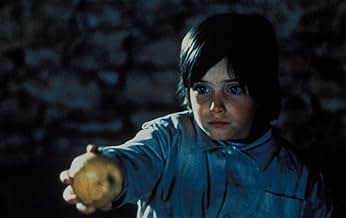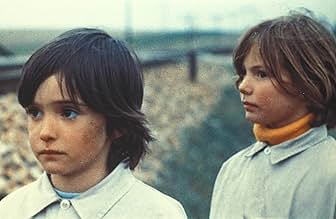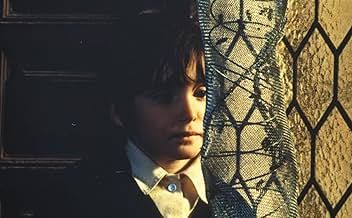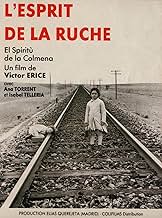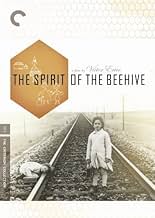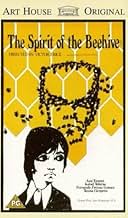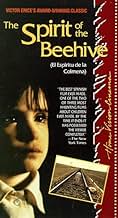अपनी भाषा में प्लॉट जोड़ेंIn 1940, after watching and being traumatized by the movie Frankenstein (1931), a sensitive seven-year-old girl living in a small Spanish village drifts into her own fantasy world.In 1940, after watching and being traumatized by the movie Frankenstein (1931), a sensitive seven-year-old girl living in a small Spanish village drifts into her own fantasy world.In 1940, after watching and being traumatized by the movie Frankenstein (1931), a sensitive seven-year-old girl living in a small Spanish village drifts into her own fantasy world.
- निर्देशक
- लेखक
- स्टार
- पुरस्कार
- 7 जीत और कुल 1 नामांकन
फ़ीचर्ड समीक्षाएं
We can give an alternative name to this movie as "the spirit of the house", for the director tries to show what is going on in this house whose windows resemble to honeycombs. Erice deliberately chooses not to give any shots with all members of the family, as there is serious feeling of alienation between father and mother, and total lack of communication and affection between them, and from them towards their children. Under that situation the only person whom Ana could touch with her words, plays and questions is her sister Isabel. Their house looks like a beehive with the queen bee, male worker bee, and child bees performing their duties only by being in the same house without touching to each other.
When Ana's best friend and her sister played on her trust and fears by deceiving her, she totally turned inward and found the image and the dream of Frankenstein ready for her friendship and to give her feeling of closeness. After she met the wounded Republican soldier, her Frankenstein's image came into being in his existence, who is considered as dangerous and outside the society by adults just like in the original Frankenstein movie. Like the girl in the latter, Ana does not see the fugitive as how adults define Frankenstein, as something to be run away from. Instead, she considers him as Frankenstein who could be her friend. I see the shadow of the "monster" on this movie used beautifully and magically by the director.
During the 97 minutes of the movie, Erice and his cinematographer Luis Cuadrado both reflect the heart of a child to us with their magical scenes, and skillfully convey the grey feeling of the civil war in the background without straightforwardly pointing their fingers to it.
Ana Torrent is a wide-eyed innocent who carries the film, as we completely enter into how she integrates her daily life, both the quotidian happenings and the unusual, with scary stories her older sister teases her with and with the film. Her beautiful eyes are expressive and haunting. As someone who had an older sister with all kinds of outlandish tales that were gullibly believed, the sibling teasing is the most natural I've seen on film.
Erice has a completely original take on the Frankenstein story, no matter how many times it has been referenced in other movies. "Ana" powerfully relates to the little girl in the film, even though she does not understand any of the darker emotions or outcomes. The film inspires her to seek out misfits and outcasts, with unintended consequences and impacts on the adult world.
The adult world is the weakest part of the film, or it's so heavy with symbolism about the 1940's period when the film takes place or of the end of Francoism in Spain when the film was made that it's lost for a viewer first seeing the film today. While sometimes the parents', teachers' and servants' behavior seems mysterious if we were just seeing it from her perspective, their obliviousness and self-involvement in their own intellectual and romantic pursuits aren't really explained, even as her father's pompous hobby somehow gives the film its title. It might be some sort of commentary on how adults have their own way of blending fantasy and reality or some other political commentary.
Seen in a new 35 MM print at NYC's Film Forum, the cinematography by Luis Cuadrado was stunning. The rural scenes of fields, forest and horizon --where dangers and threats always lurk beneath the pastoral--are beautiful, with simply gorgeous looking vignettes of childhood experiences.
I wonder if this insightful look inside a child's mind influenced such films as "I'm Not Scared (Io non ho paura)" and "Paperhouse." but the film seems so fresh and creative I was surprised that it was made in 1973.
The story is elliptically told and demands your participation in making sense of the narrative, but it's also leisurely paced and allows you to breathe in the atmosphere rather than forcing a particular reading on you. One thing you wouldn't guess from reading the other comments is how this is as much a film about nature as about history--it is like a poem of the countryside in winter, with long vistas of stone farmhouses framed against the rising sun. The film with the most similar visual palette is Malick's "Days of Heaven", but that film feels simplistic compared to the full immersion in history and memory presented in this film--a much more complete vision of the past.
Ana Torrent is unforgettable. I can think of no better film about children, yet (as with so many other things in this movie) it doesn't feel forced--these kids aren't just the director's pawns, but real, living beings.
If you get a chance to see it, definitely make the effort.
Many people here have mentioned the historical metaphors within the film but I won't delve into that, I thought the story was completely about the main character Ana.
First off, the actress who played Ana was very authentic, with a striking face full of emotion. She genuinely believed a lot of what was happening in the film including the Frankenstein monster being real! Such authenticity means it's worth seeing it for that alone and that is where the films true beauty lies...
For all this though, for what is essentially a beautifully shot film with great cinematography and performances, the film was a bit dull! It was only after the first 45 minutes or so that I started to wake up. There was a whole sub-plot between the parents marriage which I felt added little weight to the rest of the story.. There just wasn't a whole lot I felt I hadn't seen before.
So for me, I can see the film for what it was worth and why it received such accolades. But it was a little too dull for me to consider it "Great"
I recall one of my absolute favourite films ever The Fall, which also included a little girl who believed so much of the movie around her, that film was gripping from start to finish and never dull for a moment. Strange it hasn't gotten the praise it so deserved..
While there is definitely a point to be made that this film is, first and foremost, a haunting look at the innocence of childhood, the subversive political meaning was something which is primarily the result of an attempt on my behalf to tie all the loose ends together, and the conclusion below is something I arrived at based on my own personal understanding of the narrative.
On the surface, The Spirit Of The Beehive is about a family which attempts to cope with the aftermath of the Spanish Civil War. It bears mentioning that the fact that this film even dares to address the conflict in such a direct manner suggests that, two years before Franco's death, the tight censorship regime in Spain was slowly but surely loosening its grip of the domestic film industry. Up to that point many films made in Spain during the Franco era were only able to address the civil war or Franco's regime in a strongly metaphorical manner or via subversive narratives (a case in point being much of Bunuel's work, albeit done in exile, or Saura's La Caza). In fact, much of Spanish cinema during that point in history can be regarded as an excellent case study in how allegories can be used as a way of averting tight censorship.
That said, political commentary on a tangible level would not have passed the censors even at such a late stage in Franco's reign, and thus most of the criticism in ...Colmena is driven by a sense of mutual understanding between spectator and narrative. The start of the film is a case in point: a shot of a few children watching James Whale's Frankenstein (with the narrator proclaiming that "You are about to see a monster") is followed by a cut to the girl protagonist's (Ana's) father. For now assuming that this narrative is driven exclusively by metaphors, does Victor Erice suggest, with that cut, that the girl's father is the "monster" in question? Or, does he, on a more profound level equate the word father to monster? Franco called himself the "father of the nation", and with that knowledge in mind an audience could easily read that scene as a highly ambiguous, yet still extremely effective, criticism of Franco (ie. suggestively calling Franco a monster). However, due to its strongly ambiguous nature, not a single censor would be able to pinpoint that scene and say, without any discernible doubt, that this is indeed the case. It's a wonderful example of allegorical film-making, and how film techniques can be generally used to make an intrinsic statement which relies as much to the techniques applied as it does on the audience's intelligence and ability to understand the more profound meaning behind the images.
I remember once reading the viewpoint that Ana herself represents the Spanish nation, and I can see what the intention of that statement is when you consider the monster=Franco equation I outlined above. The monster Ana meets in her daydreams (as she imagines meeting the Boris Karloff figure she saw at the Frankenstein screen) is a figure which lulls her into a false sense of security and turns out to be a threatening presence; and the symbolism itself becomes very plain once the monster=Franco and Ana=Spain (though I'll admit that this is not the most original reading of the film, and aditionally one which doesn't even begin to scrape at the amount of symbolism apparent).
If only Erice was as prolific as he is imaginative, since El Espiritu De La Colmena makes up for only one third of his entire output in over thirty years (his other two films being the equally brilliant El Sur and Quince Tree Of The Sun). Needless to say, it's cinematic genius, and a flawless work of art bar none.
क्या आपको पता है
- ट्रिवियाCinematographer Luis Cuadrado was going blind at the time this film was made. An assistant would take Polaroids of the scenes and Cuadrado would direct the lighting by looking through a magnifying glass at these pictures. In 1980 Cuadrado committed suicide after he went completely blind and the tumor in his brain became too painful to face.
- गूफ़When the fugitive jumps from the train and rolls down the hill, he's wearing boots, but in the next shot he's wearing low-cut shoes.
- भाव
Ana: [unable to sleep] Isabel?
Isabel: [opening her eyes] What?
Ana: [whispering] Tell me what you were going to tell me.
Isabel: [whispering] About what?
Ana: The movie.
Isabel: Not now... Tomorrow.
Ana: Now... You promised. Why did he kill the girl, and why did they kill him after that?... You don't know - you're a liar.
Isabel: They didn't kill him, and he didn't kill the girl.
Ana: How do you know? How do you know they didn't die?
Isabel: Everything in the movies is fake. It's all a trick. Besides, I've seen him alive.
Ana: Where?
Isabel: In a place I know near the village. People can't see him. He only comes out at night.
Ana: Is he a ghost?
Isabel: No, he's a spirit.
Isabel: Like the spirit Dona Lucia talks about?
Isabel: Yes, but spirits have no bodies. That's why you can't kill them.
Ana: But he had one in the movie. He had arms and feet. He had everything.
Isabel: It's a disguise they put on when they go outside...
Ana: If he only comes out at night, how can you talk to him?
Isabel: I told you he was a spirit. If you're his friend, you can talk to him whenever you want. Just close your eyes and call him... It's me, Ana... It's me Ana...
[they hear what sounds like ominous footsteps and are silent]
- कनेक्शनFeatured in Sus años dorados (1980)
- साउंडट्रैकOjos verdes
Written by Salvador Valverde (as Valverde), Rafael de León (as León) y Manuel L. Quiroga (as Quiroga)
टॉप पसंद
विवरण
- रिलीज़ की तारीख़
- कंट्री ऑफ़ ओरिजिन
- आधिकारिक साइट
- भाषा
- इस रूप में भी जाना जाता है
- The Spirit of the Beehive
- फ़िल्माने की जगहें
- Hoyuelos, Segovia, Castilla y León, स्पेन(Town and exteriors)
- उत्पादन कंपनियां
- IMDbPro पर और कंपनी क्रेडिट देखें
बॉक्स ऑफ़िस
- दुनिया भर में सकल
- $1,90,734
- चलने की अवधि1 घंटा 38 मिनट
- ध्वनि मिश्रण
- पक्ष अनुपात
- 1.66 : 1
इस पेज में योगदान दें


![Tráiler [OV] देखें](https://m.media-amazon.com/images/M/MV5BZDcyMjExODEtZGJlYy00MGNmLWJhZTItNzQ5MTNjNzAzNDQ2XkEyXkFqcGdeQXRyYW5zY29kZS13b3JrZmxvdw@@._V1_QL75_UX500_CR0)
